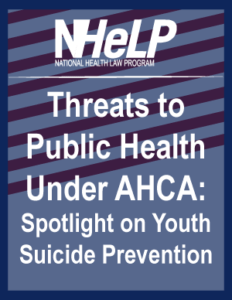 Suicide among youth and young adults has recently garnered much media attention. The Netflix show 13 Reasons Why centers on a teenager’s suicide. The recent tragic story of young pregnant woman and her boyfriend who committed suicide days apart from one another has spread widely via social media.
Suicide among youth and young adults has recently garnered much media attention. The Netflix show 13 Reasons Why centers on a teenager’s suicide. The recent tragic story of young pregnant woman and her boyfriend who committed suicide days apart from one another has spread widely via social media.
Frequent depictions or reports of suicide can lead to the phenomenon called suicide contagion, which is an increase in suicidal behavior as a result of increased exposure to suicide amongst peers and in the media. Suicide prevention programs have been shown to be effective at combating the issue. Unfortunately, many of these programs are facing an uncertain future because of potential funding cuts.
While the issue of suicide goes through waves of being highlighted in the media, its prevalence has remained a consistent cause for concern. Suicide is the second leading cause of death for youth and young adults between ages 10 and 24 in the United States, and has been for more than 20 years. Youth suicide prevention programs have been shown to have a positive impact on rates, but funding for these programs is often inadequate.
As mentioned in NHeLP’s fact sheet on the impact of the AHCA on public heath, the Prevention and Public Health Fund (PPHF), was created to combat the burden of preventable, chronic health issues through supporting public health programs. One of the ways the PPHF does this is funding youth suicide prevention and education. Since the fund’s inception, programs have been implemented in every state. To date, the PPHF has funded 372 projects for youth and young adult suicide prevention programs across the nation.
The Senate’s proposed revisions to the ACA eliminate PPHF funding beginning this year. This means that funding to critical national youth and young adult suicide prevention programs would end at a time when they are most needed. These programs are especially important for young adults who may be hard to reach as they transition out of school settings. The concurrence of these issues could have tragic implications for our nation’s youth and young adults.
If you or someone you know needs help dealing with suicidal thoughts or behaviors, please call the National Suicide Prevention Hotline at 1-800-273-8255 for free and confidential support.
